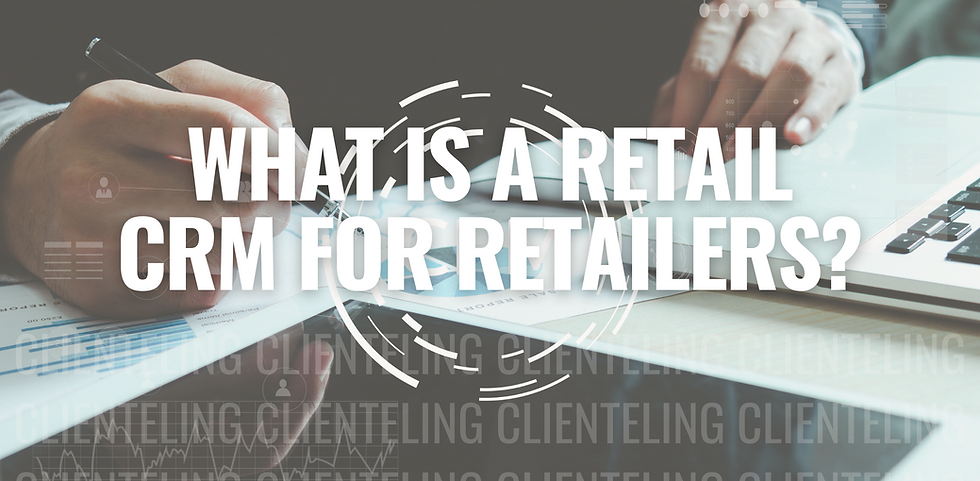Data-Driven Clienteling: Transforming the Retail Experience
- Katie Tame

- Jun 14, 2024
- 4 min read
In the dynamic world of retail, the ability to understand and anticipate customer needs is crucial. This is where data-driven clienteling comes into play, offering a powerful approach to enhance customer experiences and drive sales. By leveraging data, retailers can create personalized interactions that resonate with customers, fostering loyalty and increasing profitability. In this blog, we'll explore the significance of data-driven clienteling and how it revolutionizes the retail industry.
Understanding Data-Driven Clienteling
Data-driven clienteling is the practice of using data analytics to tailor customer interactions based on individual preferences and behaviors. This approach enables retailers to provide a personalized customer experience, enhancing satisfaction and loyalty. By integrating data from various sources, retailers can gain a comprehensive view of their customers, allowing them to deliver relevant and timely communications.

The Importance of Personalization Right Now
In today's retail environment, a personalized approach is more important than ever. Customers are inundated with options and information, making it difficult for any single brand to stand out. Personalization cuts through this noise, offering tailored experiences that make customers feel seen and valued. This personalized touch is key to building strong customer relationships, driving loyalty, and ultimately increasing sales. Moreover, with the rise of e-commerce and digital interactions, customers expect brands to know their preferences and deliver relevant recommendations. Failing to meet these expectations can result in lost sales and diminished customer loyalty.
Leveraging Data in Retail
Data serves as the foundation for data-driven clienteling. Retailers generate and collect vast amounts of data through customer interactions, transactions, feedback, and social media. This data can be both structured, like sales data and customer profiles, and unstructured, such as social media mentions and reviews. Analyzing this data provides valuable insights into customer behavior, preferences, and trends.
Enhancing Customer Experience with Data
A key benefit of data-driven clienteling is the ability to enhance the customer experience. By understanding customer data, retailers can anticipate needs and provide personalized recommendations. This not only increases customer satisfaction but also drives sales. Personalized interactions make customers feel valued and understood, fostering deeper connections and loyalty.
How Data-Driven Clienteling Drives Success
Implementing data-driven clienteling can significantly impact a retailer's success. Here are some ways it drives results:

Informed Decision-Making
Data analytics provides retailers with accurate and timely information, enabling them to make informed decisions. Whether it’s adjusting inventory levels, planning marketing campaigns, or forecasting sales, data-driven decisions are more likely to lead to successful outcomes.
Identifying Trends and Patterns
Through the analysis of historical data, retailers can identify trends and patterns that may not be immediately apparent. This capability allows them to anticipate market shifts and adapt accordingly, staying ahead of the competition.
Optimizing Operations
Data-driven clienteling can highlight inefficiencies within a retailer’s operations. By pinpointing areas for improvement, retailers can streamline processes, reduce costs, and improve overall efficiency.
Enhancing Customer Insights
Understanding customer behavior is crucial for any retailer. Data analytics provides insights into purchasing patterns, preferences, and demographics, enabling retailers to tailor their offerings to better meet customer needs.
The Role of Platforms like BSPK
Platforms like BSPK are instrumental in implementing data-driven clienteling. BSPK helps retailers collect and analyze customer data, providing valuable insights that drive personalized interactions.

Here’s how BSPK can enhance your retail strategy:
Comprehensive Data Integration
BSPK integrates various data sources into a single platform, offering a holistic view of customer interactions. This integration is crucial for making informed decisions and identifying trends that drive growth.
Personalized Customer Interactions
With BSPK, sales teams can leverage data to offer personalized recommendations and communications. This personalized approach enhances customer satisfaction and drives repeat purchases.
Streamlined Operations
BSPK simplifies data management, allowing sales teams to focus on strategic initiatives rather than clerical tasks. This efficiency leads to better customer service and higher sales.
Secure Data Management
BSPK ensures that business, client, and product details are stored securely in one centralized location. This secure storage makes data easily accessible to authorized personnel, enhancing decision-making and customer service.
The Future of Retail with Data-Driven Clienteling
As technology continues to evolve, the future of retail will be increasingly data-driven. Here are some trends and predictions:

Increased Use of AI and Machine Learning
AI and machine learning will play an increasingly important role in data-driven clienteling. These technologies can analyze vast amounts of data quickly and accurately, providing deeper insights and more personalized experiences.
Greater Integration of Online and Offline Data
The distinction between online and offline retail will continue to blur, with data integration becoming even more seamless. Retailers will be able to track customer interactions across all channels, providing a truly unified view of the customer.
Enhanced Personalization
As data analytics and clienteling tools become more sophisticated, the level of personalization will continue to improve. Retailers will be able to offer highly tailored experiences that resonate with individual customers on a deeper level.
Focus on Customer Experience
The customer experience will remain a top priority for retailers. By leveraging data and clienteling, retailers can create memorable and satisfying experiences that drive loyalty and sales.
Sustainability and Ethical Practices
Data analytics can also help retailers track and improve their sustainability efforts. By understanding customer preferences for ethical products and optimizing supply chains, retailers can contribute to a more sustainable future.
Conclusion
In the competitive landscape of modern retail, data-driven clienteling is a game-changer. By harnessing the power of data, retailers can enhance customer experiences, optimize operations, and drive sales. Platforms like BSPK provide the tools and insights needed to implement a successful data-driven clienteling strategy. As the retail industry continues to evolve, embracing this synergy will be crucial for staying ahead and achieving long-term success.




Comments